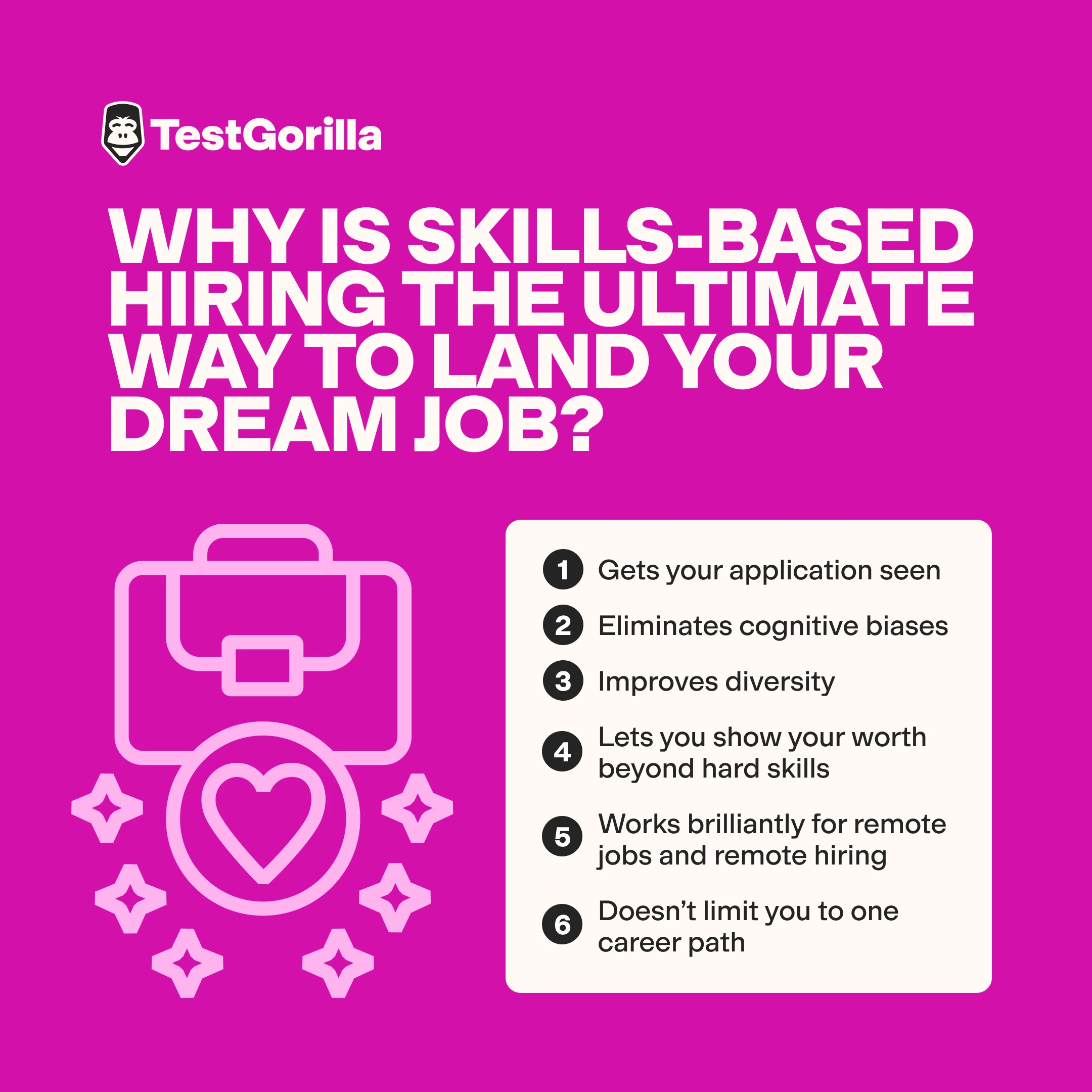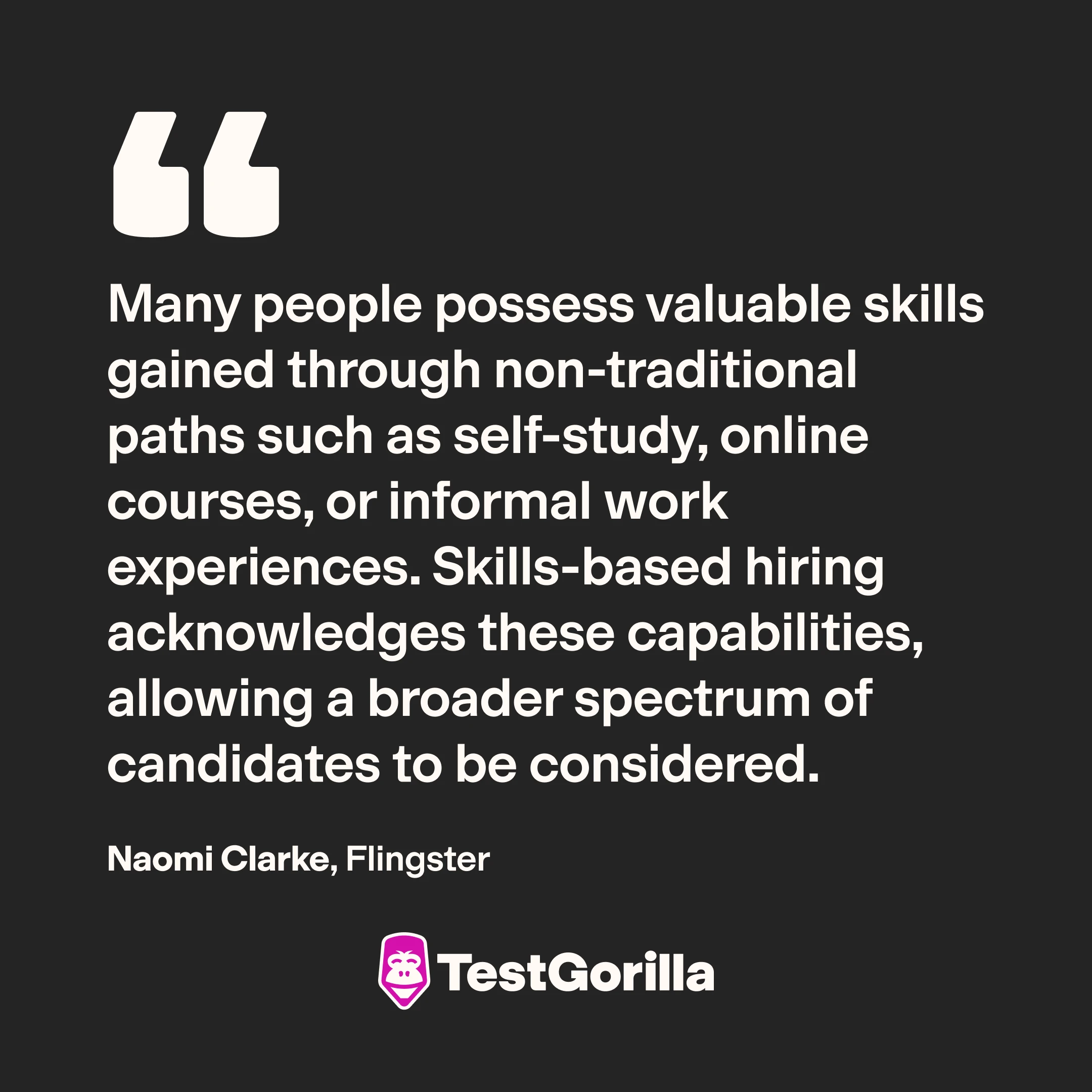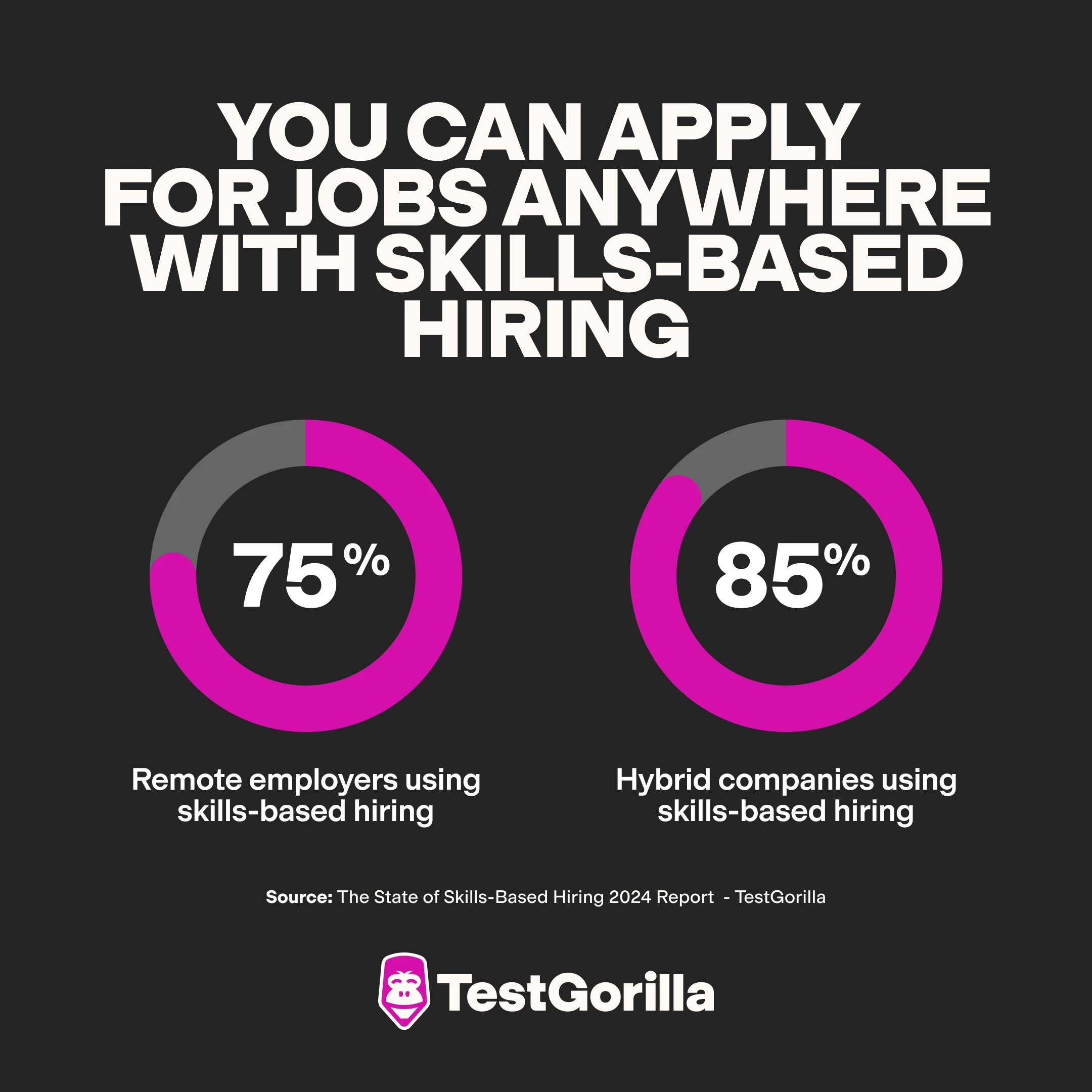Claim the job of your dreams with skills-based hiring
Today’s job market is challenging for employers and job seekers alike. While companies are struggling to fill their roles, candidates are having a tough time landing good jobs.
It’s frustrating, right? You might work hard, try to gather relevant experience, take online courses, and more – only to get rejected. Or, you might think going after a job is pointless – even if you feel capable. We get it, and we’re here to help.
Our latest research shows that skills-based hiring is the ultimate solution to these problems, and 90% of employees who took our survey agreed. Many employers are starting to see its benefits in discovering top talent. But for job seekers, it might be a new concept.
Read on to learn about what skills-based hiring is and how it can be a game changer in your job hunt.
Table of contents
Why is it so hard to get a good job?
We recently surveyed over 1,000 employees, 50% who felt finding a job in 2024 is harder than it was last year.
Let’s drill into what’s preventing you and other candidates from snagging top jobs.
Are you a job seeker?
Visit our job seeker hub to get help with your assessment, find your dream job and more.
Job markets are cooling
The last few years have seen tight labor markets, with more open jobs than skilled labor to fill them.
However, the Society of Human Resources Management (SHRM) recently reported that US labor markets have started cooling as employers seek to backfill roles they weren’t able to hire for in the last few years instead of adding more jobs.
The Chartered Institute of Personnel Development (CIPD) expects similar cooling in the UK job market.
This all means fewer opportunities for job seekers.
Competition is high, and job boards are flooded
Tech and other industries are expected to continue seeing layoffs. This is partly because companies over-hired in response to the temporary tech boom during the COVID-19 pandemic. But it's also driven by economic uncertainty, cost-cutting, the rise of AI, and rising mergers and acquisitions.
This means you’re now competing with many more candidates for the same number of open positions. We spoke to HR and hiring expert Yashna Wahal about her recent recruiting experiences:
Competition is fierce. Companies big and small are seeing candidates in the hundreds, no matter what role they’re hiring for, and job boards are inundated with applicants – many who aren’t even qualified for the job.
Everyone wants remote work
To make matters worse, most people want the same thing – a hybrid or remote work arrangement. FlexJobs surveyed 5,600 employees and found that 95% wanted some form of remote work.
But companies aren’t keeping pace. A study by Owl Labs showed that globally, only 16% of companies are fully remote, and about 44% don’t permit remote work at all.
Want a remote job? You’re competing with many more applicants for even fewer jobs.
Employers are still obsessed with fancy degrees and big employer names
Lately, there’s been lots of buzz around employers and some US state governments claiming to remove bachelor’s degree requirements from job listings.
However, our latest survey showed that for 59% of over 1,000 employers, degrees are more important now than they were five years ago. A majority – 70% – haven’t removed degree requirements from their job postings.
The Burning Glass Institute also found that employers who drop degree requirements in job postings aren’t actually changing how they hire, and college graduates are still snagging top jobs.
Additionally, even skilled college graduates can get rejected for different or senior positions – for example, because they don’t have the “right” degree like an MBA. And then there are instances where employers pick one candidate over another because they have a reputed employer listed on their resume.
Why’s this such a problem?
Expensive college fees and the rising cost of living mean more people are skipping college and starting to work immediately. According to the National Center for Education Statistics, college enrollment numbers have dropped over the last decade.
Additionally, well-connected elites have a higher chance of affording college and better access to well-reputed employers, putting them at an unfair advantage over others.
Overall, more people are skilling themselves through alternative routes like on-the-job training, online certifications, and practical tasks – and some are taking work at companies they have easier access to (including smaller, less-reputed companies).
Employers looking for degreed candidates or specific employment histories are missing out on perfectly skilled talent – and standing in the way of candidates and the jobs they deserve.
Unconscious biases creep into decision-making
Hiring is prone to several unconscious biases. These can lead to unfair decisions that hold you back from your desired job.
For instance, a recruiter screening resumes might assume that a candidate’s Ivy League education automatically means they’re perfectly qualified.
Unconscious biases can prevent decision-makers from selecting even the most capable applicants for the role. In fact, 31% of candidates who responded to our survey said they experienced unconscious bias in the hiring process – up 48% from last year.
Your dream job is becoming extinct
Maybe you’re not landing your dream job because fewer companies are hiring for it.
The speed of technological advancements, the rise of AI, and a shift in consumer sentiment have led to many jobs slowly becoming obsolete. For example, digital storage systems have reduced the need for file clerks.
Your skill set doesn’t match the job you want
Another reason you might be struggling to get your desired job? You don’t have the skills necessary to succeed in it. Let’s say you want to become an editor. If you’ve only had experience in copywriting but haven’t gained the skills needed to edit copy, you’re unlikely to bag a good editor position.
Why skills-based hiring is the ultimate way to land your dream job
Skills-based hiring is a recruitment approach in which you’re evaluated based on your real-life skills and abilities rather than what you look like on paper.
Employers who practice this approach care less about your educational qualifications, background, and prior experience. Instead, they assess you through online tests, practical assignments, simulations, portfolio reviews, and other skills assessment techniques.
We found that as of this year, 81% of employers are using skills-based hiring –
up from 73% in 2023 and 56% in 2022. So things are changing.
Here’s why skills-based hiring can benefit you.
Gets your application seen
Today, so many qualified candidates go unnoticed because of factors like unnecessary requirements, misinterpretation of resumes or cover letters, or even the sheer volume of applications.
Traditional hiring provides candidates a real chance to demonstrate their skills only in later parts of the process – for instance, interviews. This means those rejected in the beginning are never given a fair shot.
When employers put skills-based tests at the very start of the hiring process, it significantly increases the likelihood that your application will progress to the next round – if you’ve scored well on the tests.
Eight-five percent of employees told us they preferred skills-based hiring because it gave them a chance to demonstrate their skills.
Eliminates cognitive biases
We recently discovered that 84% of employees feel skills-based processes reduce both conscious and unconscious cognitive biases in recruitment.
Most employers use objective assessments like online tests to evaluate their candidates’ skill sets. This almost entirely eliminates the need for subjective, human decision-making during the screening stages of hiring.
When an applicant scores well on a test, it’s difficult for recruiters or hiring managers to choose less-skilled candidates over them – no matter how much they like the other candidates’ profiles.
Skills-based hiring also calls for more structured and objective interviews with concrete scoring systems. This helps interviewers make fairer judgments about who’s fit for a job.
Through our research, we learned that 92% of companies using skills-based hiring had clearly documented processes, training, and other practices to actively prevent unconscious biases from impacting their hiring decisions.
Improves diversity
Evidence suggests that skills-based hiring improves workplace diversity, too. In fact, our study showed that 90% of employers using this approach have seen enhanced diversity in their companies. Some part of this can be attributed to eliminating unconscious biases.
But that’s not all. Skills-based hiring decisions are rooted in the present, with little to no importance given to someone’s past achievements.
Why’s this important? Because not everyone has access to the same chance in education, networks, social mobility opportunities, and so on. For example, a recent study showed that only 34% of Black adults had an associate degree compared with 50% of White adults. Further, candidates from elite backgrounds might have better access to opportunities at top companies through networks and nepotism.
Most skills-based employers don’t care about educational qualifications or shiny companies on your resume – so long as you can perform in a role and outshine other candidates.
Naomi Clarke, chief diversity officer and community outreach strategist at Flingster, correctly pointed out –
Many people possess valuable skills gained through non-traditional paths such as self-study, online courses, or informal work experiences. Skills-based hiring acknowledges these capabilities, allowing a broader spectrum of candidates to be considered.
This benefits job seekers by giving them access to roles they might have previously been excluded from and enriches organizations by bringing in diverse perspectives and experiences.
Lets you show your worth beyond hard skills
Let’s say you possess 80% of the hard product knowledge needed for your desired customer success job and are also a brilliant communicator and patient listener.
In a traditional hiring approach where the focus is on hard skills, you could be rejected in favor of someone who knows more about the product – but doesn’t have the soft skills needed for the job. Luckily, skills-based hiring is changing this.
Our report recently shared that 89% of employers think soft skills are more important today than they were five years ago. The World Economic Forum also predicted that cognitive abilities like analytical thinking, creative thinking, and problem-solving will be some of the most in-demand professional skills over the next five years.
With this in mind, more companies are using a multi-measure testing approach, where you’re assessed on multiple “measures”: your hard and soft skills, cognitive abilities, personality traits, and more. This gives you the chance to show them who you are and how you can contribute to the company beyond your technical skills.
Recommending reading: 8 ways to deal with job rejection in 2024
Works brilliantly for remote jobs and remote hiring
With more employees working remotely, Forbes predicts that 90% of employers will also move to remote hiring. Screening and assessment tools like online talent assessments make showcasing your skills to employers from the comfort of your home or local cafe easy.
In fact, we found that of the employers using skills-based hiring, 75% were remote and 85% were hybrid companies. This means you can apply for jobs anywhere.
Doesn’t limit you to one career path
When you’re recruited for your educational credentials or past experiences, you’re often associated strictly with your degree or the sector you’ve worked in. For example, employers looking for computer science degrees often put candidates in a tech bucket of sorts and could, for instance, reject a computer scientist for a marketing role they’d acquired the skills for.
Skills-based hiring takes the emphasis away from education or prior experience, acknowledging that skills can be learned and even transferred. Eighty-one percent of the employees we surveyed gained access to new employment opportunities because of skills-based hiring.
Anna Williams, HR Director at Digital Silk, shared a great example –
Remember, skills aren’t industry-specific. A marketing expert might have strong writing skills that are valuable in content management or customer service roles. Similarly, an IT professional may have problem-solving skills useful for operational or project management roles.
Skills-based hiring creates an even playing field, encouraging applicants to demonstrate their potential. It's a modern approach to recruitment and one I believe will continue to grow in popularity and significance. It's high time job seekers make the most of it.
The employers in our survey support this notion – 63% said that skills-based tests helped them see their candidates’ potential.
How to use skills-based hiring to your advantage
We know what you’re thinking: Adopting skills-based hiring is really an employer’s decision – not yours. While that’s true, you can take certain steps to tilt the odds in your favor.
Upskill and reskill
With the speed of technological advancement and changing market dynamics, the World Economic Forum predicts that 44% of workers’ skills will be disrupted in the next five years.
The role you work in today could change or become extinct in the future, so upskilling and reskilling yourself through online courses, workshops, on-the-job training, and more is important.
You can try to demonstrate the fruits of your efforts, too – for example, by creating a portfolio of work to show potential employers.
If the employer you want to work for uses skill-based assessments, you can then prove you’ve got the necessary skills.
Make the most of practice questions and tests
Research online testing platforms that offer practice tests or practice questions. This will give you a better understanding of your strengths and weaknesses.
For instance, you might think you’re great at Excel. But if you want a job that requires advanced Excel skills like VBA and Macros, and you’re unfamiliar with these concepts, you’re unlikely to get the gig.
Practicing questions is a great way to see where there’s room for improvement and brush up on your skills before applying for your dream job.
Consider the right job boards and create skills-based profiles
Popular job boards like LinkedIn and Monster show jobs across a wide range of employers – some that use skills-based hiring and some that don’t.
To give yourself the best chance at success, put skills at the center of your profile. For example, in addition to listing previous job titles and company names, mention the skills you’ve gained in each position. Many employers use AI to screen platforms and identify those profiles that have relevant keywords – including skill-based keywords – for their open jobs.
An even better approach is going beyond these traditional websites and looking for skills-based job boards. TestGorilla’s job board, for instance, enables you to target employers specifically hiring for skills and demonstrate your skills as one of the first steps of your application.
Study the job profile carefully and nail the process
Go through job descriptions with a fine-toothed comb, as they’ll often give you hints about the employer. Where you see a greater emphasis on degrees or years of experience, the company is likely using a traditional hiring approach.
However, if you see skills-based job descriptions, take note of the hard and soft skills, traits, and cognitive abilities the employer is looking for. This type of role description points to a skills-based approach and gives you deep insights into what an employer is looking for in an ideal candidate.
Eighty-five percent of employees who responded to our survey agreed that skills-based hiring helped them to better understand the requirements of a role. Sixty-seven percent also said it helped them see which skills they’d be using in a job.
Knowing this information helps you assess whether you have the right skills for a job – plus, it helps you write your job application and prepare for interviews.
If you write a resume, make it skills-based
Here at TestGorilla, we believe resumes are pointless pieces of paper that give employers no real insight into your skills. However, we’ve found that even employers using a skills-based approach still look at resumes as part of their hiring processes. So, you should make sure yours is up to the mark.
The best way to do this? Spotlight your hard and soft skills on your resume, especially if you’re falling short of education or other application criteria.
That said, make sure the skills you list align with what the employer is looking for and that you clearly specify how you used the skill and what its outcome was. For instance, simply listing “skilled in Java programming” isn’t good enough. Instead, consider something like “used Java to develop a customer-facing application that improved client data management efficiency by 30%.”
Get discovered with skills-based hiring
Landing your dream job isn’t easy – especially in today’s changing job market. But 90% of employees believe that, despite these challenges, skills-based hiring can help them snag the jobs they want.
Skills-based hiring lets you showcase your real-world skills to employers. It also works well for remote roles, gives employers a holistic view of your capabilities, and provides insights into your potential. Learn more about all its benefits by reading our full report.
And as your job search continues, shift the focus onto your abilities. Consider applying through skills-based job boards, writing skills-based resumes, and using talent assessments to learn about and better prepare for a job. These steps can put you ahead of the competition and help you show the world what you’re really worth.
Related posts
You've scrolled this far
Why not try TestGorilla for free, and see what happens when you put skills first.
Latest posts
The best insights on HR and recruitment, delivered to your inbox.
Biweekly updates. No spam. Unsubscribe any time.

Skills tests to hire the best
Our screening tests identify the best candidates and make your hiring decisions faster, easier, and bias-free.
Free resources
A step-by-step blueprint that will help you maximize the benefits of skills-based hiring from faster time-to-hire to improved employee retention.
With our onboarding email templates, you'll reduce first-day jitters, boost confidence, and create a seamless experience for your new hires.
This handbook provides actionable insights, use cases, data, and tools to help you implement skills-based hiring for optimal success
A comprehensive guide packed with detailed strategies, timelines, and best practices — to help you build a seamless onboarding plan.
This in-depth guide includes tools, metrics, and a step-by-step plan for tracking and boosting your recruitment ROI.
Get all the essentials of HR in one place! This cheat sheet covers KPIs, roles, talent acquisition, compliance, performance management, and more to boost your HR expertise.
Onboarding employees can be a challenge. This checklist provides detailed best practices broken down by days, weeks, and months after joining.
Track all the critical calculations that contribute to your recruitment process and find out how to optimize them with this cheat sheet.


















